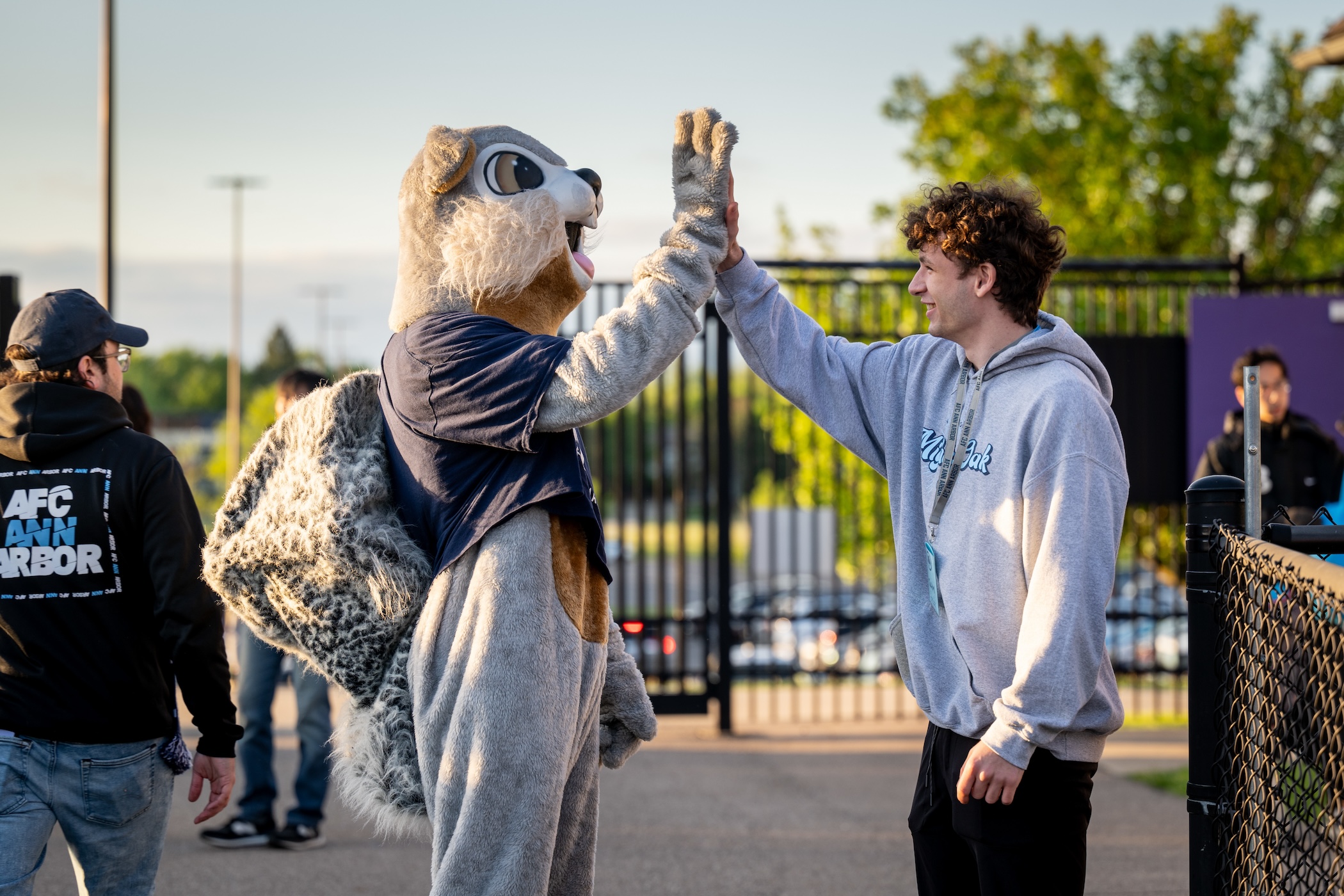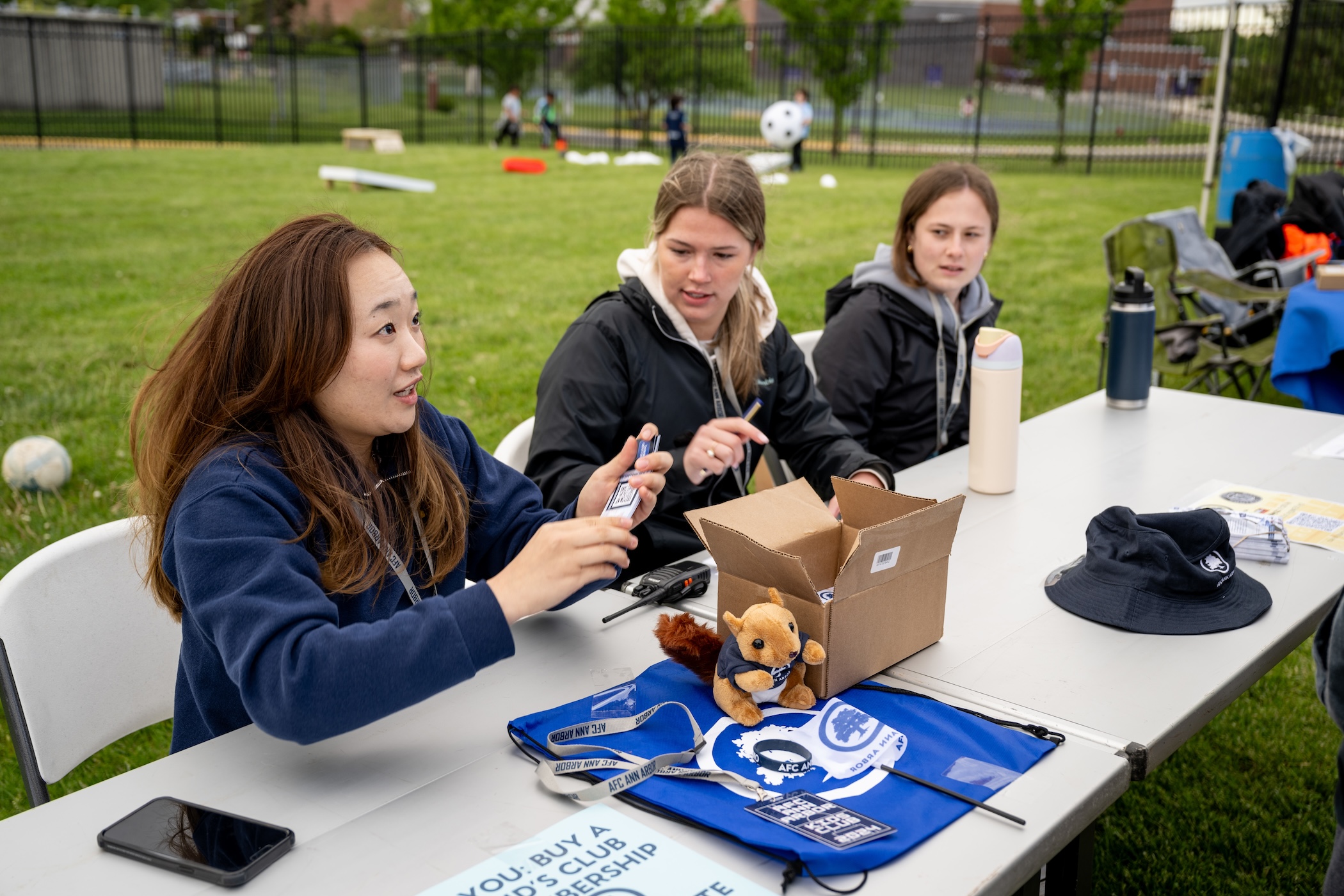
 Back to News
Faculty Excellence
|
Student Success
Back to News
Faculty Excellence
|
Student Success
What does it take to run a sports team?

Alejandro Echeverria (SM ‘23) has always loved soccer, whether he’s playing it himself or cheering for his favorite team, FC Barcelona.
So, when Echeverria heard about an opportunity to help out with AFC Ann Arbor during his senior year at the University of Michigan, he was immediately intrigued. The semi-pro soccer club is co-owned by Michal (Mike) Lorenc, who became a clinical assistant professor at the U-M School of Kinesiology in fall 2023.
Echeverria threw himself into volunteering, from creating videos for the club’s social media pages to landing new sponsors.
“It was such a valuable experience for me,” Echeverria says. "At the end of the day, actually going out and being proactive and gaining industry experience is the best way to learn."
Echeverria was one of close to 200 students who are putting sport management theory into practice, thanks to a new partnership between the university and both the men’s and women’s AFC Ann Arbor teams.
As volunteers, students are coming up with new community outreach and marketing ideas, developing merchandising strategies, offering feedback on jersey design, organizing special themed games, and reviewing club finances. They’re writing five-year growth plans and helping the club re-launch its nonprofit arm, the AFC Ann Arbor Foundation. One student even served as the club’s mascot, Nutmeg the squirrel, at an event.

“We want to give students an in-depth look at the day-to-day operations of a smaller-scale sports entity,” Lorenc says. “The idea was to expose them to the actual, real-life business challenges, the community challenges, and then give them the opportunity to start solving those problems and gaining experience.”
Lorenc comes to the university after 20 years at Google, where he worked with ticketing, sports, music, and live events companies. Nearly a decade ago, he also co-founded AFC Ann Arbor, to bring more soccer into the community as well as help Division I and Division II college athletes improve their skills and move up into the professional ranks.
When Lorenc joined the SoK faculty last year, he saw AFC Ann Arbor as the perfect hands-on learning opportunity for students — especially first-years and sophomores, who are still learning the fundamentals of sport management.
He mentioned the opportunity in his classes last fall; members from several student organizations, including the Michigan Sport Consulting Group, the Michigan Sport Business Conference, and the Michigan Sport Venture Group, were eager to get involved as well.
Lorenc began holding weekly meetings in the SoK Building, where students pitched ideas and brainstormed ways to help the club overcome its latest challenges. Throughout these discussions, Lorenc connected the dots between what was going on at the club and what students were learning in their classes.
“We discuss all aspects of the club’s operations so they have visibility into what it’s like to run a sports organization,” he says. “I’m trying to be as transparent as possible — they know our finances, they understand which players we’re trying to sign, they know the cost of traveling to different places. Providing that level of access can be very beneficial because it makes things much more tangible and real.”

Right now, students are volunteers. But, moving forward, Lorenc hopes to create an internship program that will, ideally, propel students to internships at other organizations and, later, to full-time jobs.
More broadly, he also hopes to open students’ eyes to soccer, one of the fastest growing sports in the United States. While many sport management students are focused on the “Big Four” — Major League Baseball, the National Football League, the National Hockey League, and the National Basketball Association — Lorenc wants them to expand their aspirations and think globally.
“If somebody is only thinking about working for the established leagues in the U.S., they don’t actually have the opportunity to innovate as much,” he says. “If you can identify something in our industry or a new industry that will grow faster than others, this is the best opportunity to learn. Soccer and the growth in women’s and international sports offer that opportunity.”
Photos by Scott Soderberg/Michigan Photography